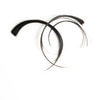|
People the world over swear by coconut oil as the all-natural beauty product they have been waiting for, but did you know it can actually be harmful for certain hair types? Far from offering the complete hydration that is promised, many people find that coconut oil can in fact have a drying effect. The determining factor is often what your natural hair type is and how you are using the coconut on your hair. Read on to learn about whether you ought to be including this ingredient in your care routine, and how. The benefits of coconut oil for hair and skin
Coconut oil is full of healthy saturated fats and offers a distinctive and delicious taste making it a beloved ingredient in many foods. In recent years however, many people have also begun to celebrate the wide and varied cosmetic benefits coconut oil offers. Due to its antimicrobial properties, coconut oil has natural anti-fungal properties making it an important aid for a number of skin issues, such as acne and athletes foot. What’s more, due to its naturally hydrating properties, the oil can be used as a moisturizer and is effective at reducing dryness. The benefits of coconut oil for hair are well-documented and varied. While it may seem counter-intuitive to apply oil directly to the hair, it doesn’t not have the heavy and greasy effect you may think: instead it naturally strengthens, cleanses and smooths the hair. Comprised of medium-chain fatty acids, the oil from coconuts is able to penetrate much more deeply into the hair shaft than other substances. As such, it can provide much needed moisture to dry hair and help strengthen the cuticle to help prevent split ends. Different ways to use coconut oil for hair There are a number of different ways to use coconut oil for hair. The most popular are:
For anyone looking to use coconut oil for a hair mask the process is quite simple. Follow these tips for a deep and hydrating experience.
When you shouldn’t use coconut oil for hair The very things that make coconut oil so well suited as a treatment for some types of hair, can equally make it have more damaging effects on others. The high concentration of lauric acid that naturally occurs in coconut oil helps it to reduce protein-loss from hair strands. For hair that is very fine and benefits from added strength, this is a huge asset. However, if your hair is coarse and comprised of thick individual strands, using coconut oil for hair treatments could prove counterproductive: rather than smoothing the strands, the oil can create a protein buildup, exacerbating their stiffness. A great alternative to coconut oil for hair is a weightless smoothing oil or serum that seals the cuticle without weighing the strands down. Try out the GLISS Oil Nutritive Weightless Oil to achieve light-as-a-feather frizz-fighting that also leaves hair feeling soft and shiny. From Schwarzkopf.com Hair by Brian - The Beauty Blog
0 Comments
Your comment will be posted after it is approved.
Leave a Reply. |
Hair by BrianMy name is Brian and I help people confidently take on the world. CategoriesAll Advice Announcement Awards Balayage Barbering Beach Waves Beauty News Book Now Brazilian Treatment Clients Cool Facts COVID 19 Health COVID 19 Update Curlies EGift Card Films Follically Challenged Gossip Grooming Hair Care Haircolor Haircut Hair Facts Hair History Hair Loss Hair Styling Hair Tips Hair Tools Health Health And Safety Healthy Hair Highlights Holidays Humor Mens Hair Men's Long Hair Newsletter Ombre Policies Procedures Press Release Previous Blog Privacy Policy Product Knowledge Product Reviews Promotions Read Your Labels Recommendations Reviews Scalp Health Science Services Smoothing Treatments Social Media Summer Hair Tips Textured Hair Thinning Hair Travel Tips Trending Wellness Womens Hair Archives
June 2025
|
|
Hey...
Your Mom Called! Book today! |
Sunday: 11am-5pm
Monday: 11am-6pm Tuesday: 10am - 6pm Wednesday: 10am - 6pm Thursday: By Appointment Friday: By Appointment Saturday: By Appointment |


 RSS Feed
RSS Feed